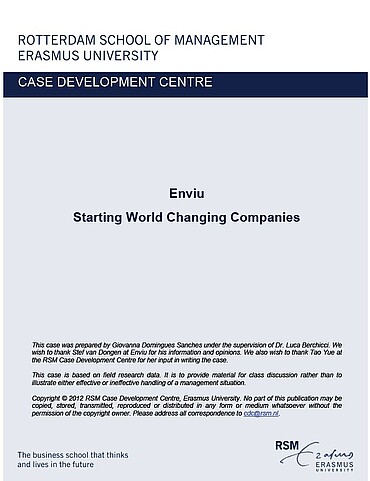Citation Note
Category winner at 2012 - EFMD Case Writing Competition.
Based on field research; 7 pages.
Follow the 'handle' link to access the Case Study on RePub.
For EUR staff members: the Teaching Note is available on request, you can contact us at rsm.nl/cdc/contact/
For external users: follow the link to purchase the Case Study and the Teaching Note.
Objective
This case serves five main objectives: 1. To understand how motivation and drive to change the status quo are essential elements in becoming an entrepreneur. 2. To understand the importance of networking and co-creation to gather resources currently not owned by an entrepreneur. 3. To analyze the complex evolution of a sustainable venture: a. From a non-profit to a for-profit organization with a strong focus on socio-environmental issues; and b. From a start-up with a non-profit business model to a for-profit business model that allows for growth of sustainable ventures. 4. To realize the complexity in addressing both market and socio-environmental issues. 5. To explore the challenges in growing ventures through hybrid business models.
description
Are impact-driven, sustainable ventures fundamentally different from high-growth potential business ventures? How should the non-profit Dutch organization, Enviu, design and finance its growth strategy?
Abstract
Abstract. The Dutch company Enviu evolved from a small non-profit organization to a more flexible commercial firm that combined social changes with profits between 2004 and 2010, when 'Enviu' also became a brand associated with social and environmental projects led by enthusiastic employees and a large community of passionate volunteers. Despite its increasing recognition, the founder of Enviu saw that to achieve a greater social and environmental impact, the ventures Enviu chose to initiate would need to scale up and grow. Were impact-driven, sustainable ventures fundamentally different from high-growth potential business ventures? How should Enviu design and finance its growth strategy?
usage
The case is suitable for MBA, EMBA, Bachelor and Master’s students in entrepreneurship or corporate social responsibility courses.
